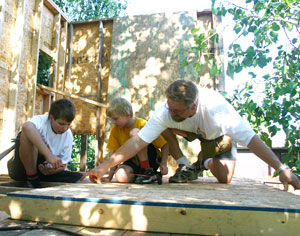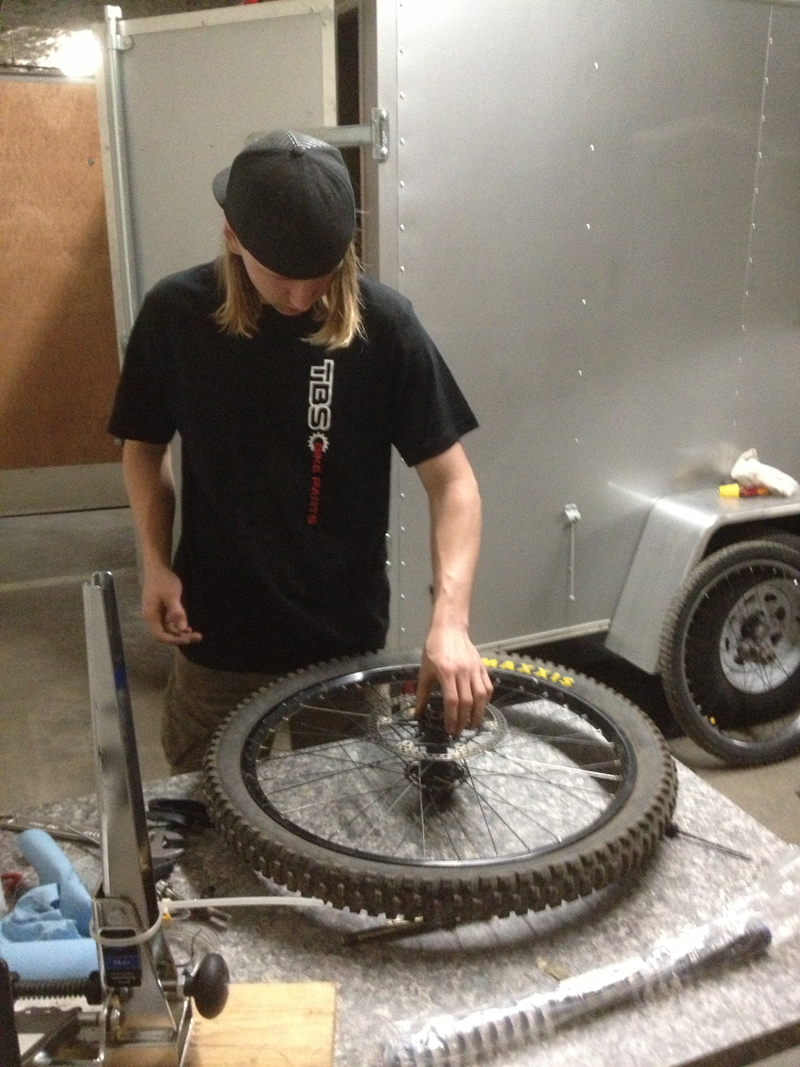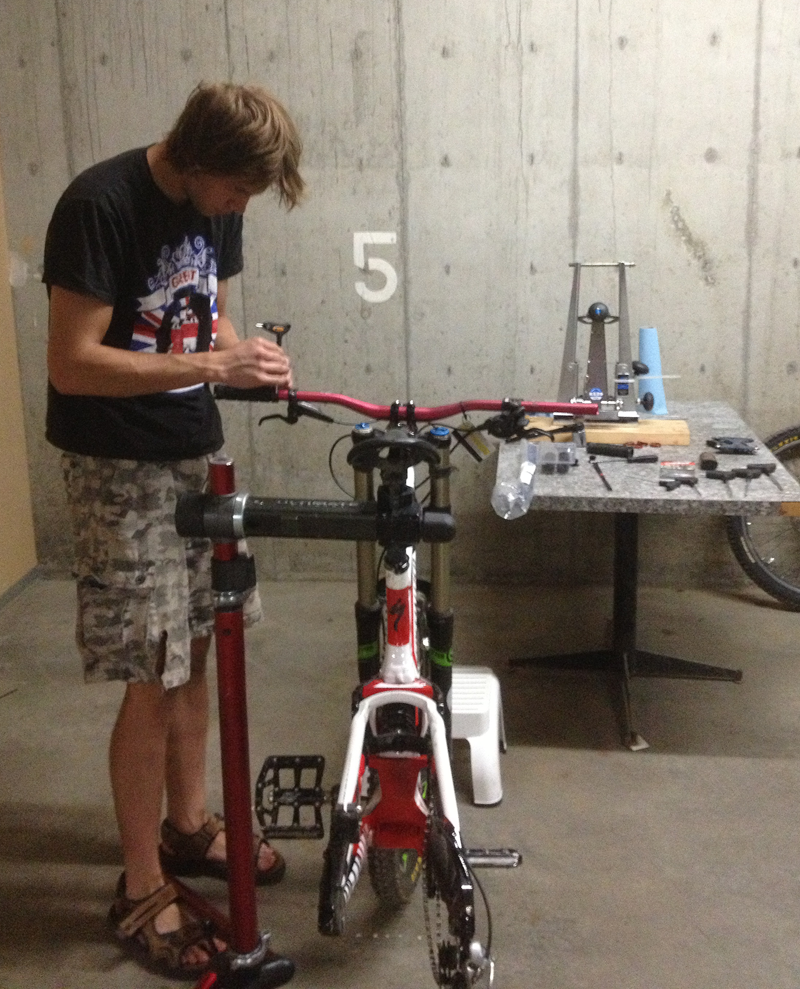
Involve and Challenge Me and I Learn!
My journey in becoming an intentional father started when my first son was born just over 17 years ago and my second son was born two year later. Until they were 10 and 8 I worked from home and was available for my boys and my wife. During that time I was an unintentional intentional father because of the circumstances that contributed to my working situation and my family life.
Before I go on I think need to define what I mean by “intentional father” and “intentional fatherhood”. An intentional father is a man who makes a conscious reflective and consistent effort at being a genuine father for his children, immediate and extended family and for society in general. An intentional father is a man who thinks long and hard about what he does and believes about: his work, the choices that he makes regarding how money is spent, leisure and entertainment activities are pursued and what type of example and legacy his life provides his family. An intentional father works at being a father and sees this responsibility fall directly in line behind his responsibility to his God and then to his wife.
My wife and I have been blessed with two healthy, strong and caring boys who have grown into wonderful young men. As I indicated earlier I had been relatively successful early on at a being an intentional father but my circumstances and situation contributed, as much if not more, to my being a good father than my reflective thoughts and actions. I worked hard at developing my relationship with my boys, strove to be a good example to them and invested significant time in their lives. About 18 months ago I realized that the formative years for boys extend well beyond the typical infant/toddler to young child ages of 0 – 7 or 8. The teen years are perhaps equally formative in shaping boys into men.
I had read a study that looked at the impact of time fathers spent with their teenage sons and was shocked to see that the average father spent just under an hour a week with his 15 year old son. I knew that I wasn’t such a father and simply looked back at my past record and could easily point to several hours a day spent with my boys. But my position as the Vice President Academic at Concordia University College of Alberta was consuming 60-70 or more hours a week and I was becoming one of those fathers who was not spending the time with his sons that they deserved and needed to grow into positive young men who would contribute to society. The study revealed that fathers have the ability to call their sons on things that mothers or peers aren’t able to and the commitment of time also tells the young man that he is worthy of his father’s time. The study also revealed that was a strong correlation between the time a father spend with his sons to their being more successful academically, socially and financially. On the negative side, the study revealed that the less time fathers spent with their sons the less socially adjusted they were and the more likely they were to get into significant trouble and even spend time in jail. This study was the slap in the face that I needed to wake up but it took an even bigger slap to get me to make a significant adjustment.
In the winter of 2012, the faculty at Concordia University had voted to unionize and we had started working on the collective bargaining agreement in the late spring. This was a very uncomfortable adversarial situation that required that I spend significant amounts of my time working out the details of the first faculty contract. I changed my family vacation to accommodate the faculty association demands and cut short my boys downhill biking trips significantly so that I could be available for the negotiations. My heart ached the night I had to tell my boys that I would be flying back early from the bike trip to resume the contract negotiations. This was the point I realized fully that I was not a change agent who was going to be able to help Concordia move into the 21st Century and help build the most effective digital learning environment for our students. Rather, I was an academic administrator/bureaucrat who would have to spend the next several years working with a group of faculty more interested in their rights and the details of the collective agreement than in what the students needed and deserved. I must acknowledge that there are some exceptional faculty members at Concordia who genuinely care about their student’s need.
When I interviewed for the position I repeatedly warned the faculty, staff and senior administration that I was a change agent and could help move the institution forward only if there were enough people interested in innovation and progress. A good leader should be able to move an organization forward but only if there is even the slightest desire for progress and change. As Seth Godin, author of Tribes points out a good leader also recognizes when it is time to move on. My heart ached even more when I realized that I was spending so many hours with several people who didn’t respect me and the leadership team (once again not all faculty members were disrespectful) and I was only able to give minutes to wife and boys who loved and cherished me. The night I left for my abbreviated holiday with my family I silently muttered a pray that I would find a way out of this horrible situation.
A couple of weeks later when I returned early from our family biking trip I was greeted by President Krispin who informed me that the University Board had met and decided that I was not the best person to handle the union negotiations. They acknowledged that I had brought about significant change and improved student services, marketing and recruitment and laid the foundation for the academic plan but the union saw me as an impediment to moving negotiations forward. The Board also believed that while I had won over the students, the staff and administration, the faculty were not comfortable with me as a change agent so we discussed our options and I decided that it would be best for me to resign. On the one hand this hurt my pride because I had been so successful at implementing so many changes and improvements in a very short period and had only started with the union negotiations. I knew that I would also succeed with this part of my job as well. On the other hand this was a huge relief, because I didn’t want to commit so much time and effort to a group of people that didn’t believe they needed to move into the 21st Century and that had no respect for my passion, skills or my office.
This was also the point where I committed to becoming an intentional father.
From September 2012 until now I have had the most amazing time with my wife and boys. I have worked closely with Levi and Caleb on several projects, their school work, biking and other sports, read books together and in general renewed my relationship with them. The boys have grown and accomplished so much in this past year and learned how important relationships with friends and family can be. Their band, My Last Lie, played several concerts and they recorded their first single (Hate You). An elderly neighbour across the street lost her husband and Caleb stepped up and helped out with snow removal and other chores, Marilyn checked in on her and did her shopping and all of us were available to help out. Marilyn’s good friend lost her mother and she was available for her in this difficult time. We all spent more time with my mom, sister and brother and worked as a family on several projects. Levi qualified as a Lifeguard and got his first part time job as a rink supervisor in Highlands. All the while I was there for all these events and milestones and continually reflected on my role as a father and considered what my boys were learning from me and how effectively I was modelling man and fatherhood.
I have finally come to grips with the responsibility that I have to raise my boys to be positive young men who can contribute to society. To do that I have to put their needs before my desires–that includes my career plans. What example am a setting if I tell my boys to follow their dreams and do what it takes to succeed but I am not willing to support their dreams by my actions? A man is not judged by his spoken words but my his unspoken words and for the past few years my actions were shouting out that it is okay for a man to drag his family across the continent to pursue his career at the expense of his family’s needs. Sure I put in a token effort but it wasn’t enough. When we were in Texas we spent a few weeks up in Colorado downhill biking each summer but a few weeks each year doesn’t a professional make. And just when my family was getting settled with life in Texas we headed back up north to Edmonton so that I could make my next career move. Once again a days travel away from the mountains and no closer to supporting my boys dreams…until now.
During this amazing time of reflection and growth I was looking for a new work opportunity and we as a family decided that the lower mainland of BC is where we needed to be. If you want to be a professional downhill mountain biker, you need to go where the mountains are and where you can grow in the sport. There is no better place to be than the North Shore and Whistler. I turned down several lucrative and career building opportunities because they would have taken me back to the US, the Middle East or other parts of the world. While these opportunities would have been great for me, these potential moves would have been devastating for my boys. Downhill biking does not happen in the deserts of Qatar or south west Texas. We finally decided that we would move to the lower mainland of BC after spending the summer in the mountains at Silver Star in Vernon and also at Whistler and trust that an opportunity would present itself.
When the temporary position came up at BCIT I almost didn’t apply because it was for a 6 month term and I initially believed I needed a bit more stability and could do better. Who was I kidding; I wanted stability but had uprooted my family several times over the past years moving from Edmonton, to Lethbridge, to Texas and then back to Edmonton, all the while pursuing and advancing my career.
This is where I finally get to the intentional father part. The move to BCIT and BC in general is a step of faith and this move is not about me. It is about my family. The boys get to pursue their dreams in Silver Star, the North Shore and Whistler and we all get to be closer to my wife’s family. I have always known that I can work anywhere so I have leveraged my skills and abilities to get us to BC. This also means that I am having to step back from being a senior executive and take on a position that doesn’t consume all my time.
This step back is also one of the hardest things that I have done because it has shown me just how arrogant and proud I have been about my accomplishments. I had been using my career as my source of my identity and self worth and I have finally put myself in a position where this is no longer the case. Coming to grips with the fact that I have to continually and intentionally weigh all my decisions against the measuring stick of “how will this benefit my wife and boys” has been one of the most important turning points in my life. I am now working hard on my journey to become an intentional father. In the coming months I will be writing about my journey and look forward to your comments and feedback.


































